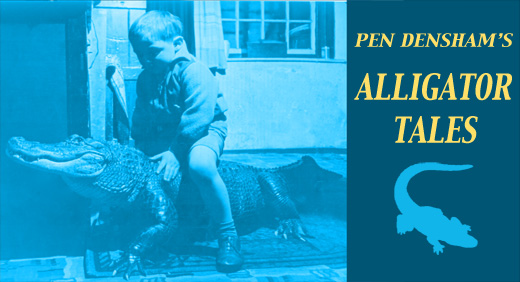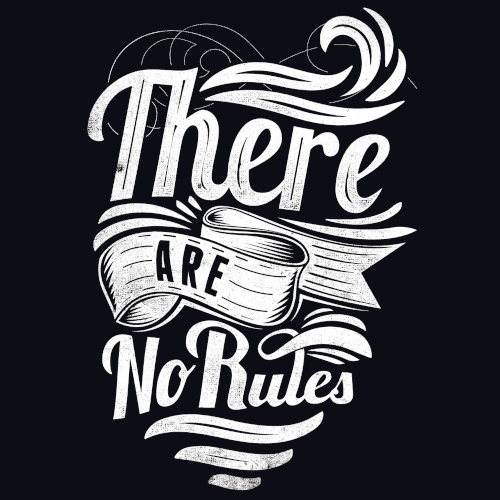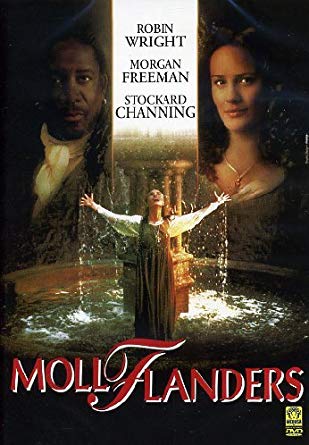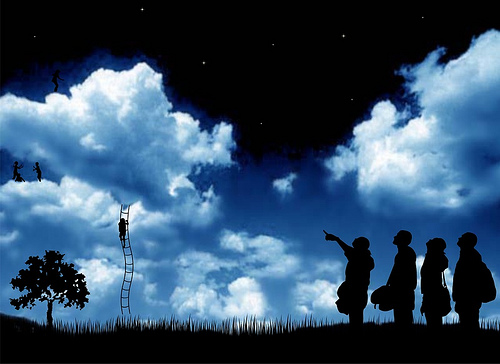Interview with Pen Densham, Writer & Producer of Robin Hood: Prince of Thieves; Moll Flanders; Rocky II and More…
I had the great pleasure of talking to Pen Densham about his book, Riding the Alligator: Strategies for a Career in Screenplay Writing … and Not Getting Eaten.
“One thing I know for sure; without writers, we in the entertainment business are aimless wanderers looking for a place to be. My thanks to Pen for this inspirational book.” – Morgan Freeman
As a director, I cannot achieve my goals without the help of creative and courageous writers. Pen’s book is unique in that it addresses the entire landscape of movie writing as a career, and most especially encourages artists who write from the heart and strive for originality.” – Ron Howard
While doing my research on Pen and his book, I was amazed. Amazed that his life story hasn’t been made into a movie.
Maybe Father Doesn’t Know Best?

When Pen was very young, around five years of age, he got his first role in the movies—riding an alligator. His dad filmed him. He suspects his mother was not in attendance. At age fifteen, Pen quit high school. He spent his early years doing everything he could do to conjure himself a career in film and television. And, in an industry so full of rejection, so littered with broken dreams, he made it.
Pen Densham has written, produced, consulted and directed movies and television shows. His eclectic string of projects includes Robin Hood: Prince of Thieves, Backdraft, Moll Flanders, Rocky II, Blown Away, Footloose as well as the TNT movie Houdini and the successful reboots of the classic TV series The Twilight Zone and The Outer Limits. He’s worked with and learned from people like Morgan Freeman, Jeff Bridges, Robin Wright, Bill Murray, Kevin Costner and Jodie Foster.
This “B” Is Still Big Even Among Q’s
The films and television series Pen Densham and his partner have produced have grossed over $1 billion. I suspect the “B” should be capitalized in Billion. If it shouldn’t, it ought to be. Even with the new monetary policy of quantitative easing (Q2, Q3, QinfinityPlus2, or whatever we’re on now) of the money supply, that’s still a heap of money.
Just One Thing

And of all thing things that Pen did to create a successful Hollywood film career, he credits just one thing for his long track record of success. Just one key factor that we will get to at the end of the interview. (You didn’t think I was going to spill the beans that quickly did you?)
STEVE KAYSER: What a life story you have. You dropped out of school at fifteen; you traveled a path that was filled with hurdles and rejections. You not only survived, but you thrived. It’s a wonderful story. Sounds like a movie. Is anybody ever going to make it?
PEN DENSHAM: I don’t think so, I guess I’m sort of still living it. One of the things I’m most content with is not making myself exceptional. I think as an artist, what I’m most content with is that I did have a rough time, but it doesn’t mean that it makes it impossible to succeed. I’d hate it if anything you’d speak about me made me seem more exceptional than other people.
STEVE’S THOUGHT BUBBLE:
I’d like to be “not exceptional” like Pen. Does that mean I’m exceptional? Nah, impossible. You see how great writers and storytellers work? They use words that confuse your own thought bubbles.
PEN DENSHAM: I think anyone with a passion, whether business or art if you care about something and it’s not knocked out of you, it helps you to keep going forward.
I’m not all that special.
ANOTHER STEVE THOUGHT BUBBLE:
I’d like to be “not special” like Pen. But if I’m “not special,” that must mean I’m special. That’s not true either. See how crafty that is? Penned again!
PEN DENSHAM: I’m scared a lot, I fail sometimes. But in our business, you fail more than you succeed—it’s kind of like the gold rush. You’re out there trying to find the next great nugget, and as long as you don’t quit, sometimes you do find it.
STEVE KAYSER: Riding the Alligator, the title of your new book, is a wonderful metaphor. The grappling, the wrestling with the creative and critical side of writing and the business side of pitching and story-selling. But it’s not just a metaphor is it? You did ride an alligator, a seven-foot-long gator when you were a little kid. Isn’t that true?
PEN DENSHAM: Yes. I was with my parents when I was very young, three-to-five years old. They were making short films in England. Going into the theater was like watching magicians. Watching my father as kind of a sorcerer who put these magic images on the screen, and they did put me on an alligator for a short film about people who kept weird pets. I don’t think my mother was there that day, but it was unnerving for me. This woman had an alligator and a crocodile. She had the crocodile in a large tank with glass sides to it. I can remember her standing in between the crocodile and me; I remember it to this day. She was admonishing me not to go toward the tank. The alligator she didn’t seem to care so much about. But that experience, I jokingly say, was my first job in show business.
STEVE KAYSER: What is Riding the Alligator, all about? (You can download a free chapter of “Riding the Alligator” – HERE.)
The Rules Are Simple …

PEN DENSHAM: I tried to create a book that would not give rules about how to be creative because I think the most powerful thing is that creativity comes out of you naturally. That’s something Hollywood doesn’t necessarily teach or help you with.
A lot of books are great at articulating the mechanisms for laying out a page or for plotting a structure, but the magic comes from letting something come out of you that’s never existed before.
There shouldn’t be rules against it.
That’s why I say in my book to ignore anything that I say that goes against your creative process. If I can encourage people to take the risk of putting ideas down and overcoming the fear and doubt, good things will happen.
STEVE KAYSER: Trust your gut. Go with your heart.
PEN DENSHAM: Yes.
STEVE KAYSER: I love your movie, Robin Hood: Prince of Thieves. In fact, Friar Tuck might be my favorite character of all time. He had such a grasp of the divine. Worldly and otherwise.

This is grain… which any fool can eat. But for which the Lord intended, a more divine means of consumption. Let us give praise to our maker, and glory to His bounty, by learning about….. beer. – Friar Tuck
What a wonderful story on the screen. But getting it to the screen was a story as well. A complex one, full of fear and doubt.
PEN DENSHAM: Yes. What happened at that time, I had just had the privilege of watching my wife give birth to my son via an emergency Cesarean. It caused me to think, “Where are the people that actually protect people as opposed to killing people?” It made me want to make a movie about Robin Hood, and the idea came to me to put a Muslim and a Christian side by side where they both collaborate against a greater dark force.
Best Stupid Idea Ever Heard
I pitched it at three different studios—Disney, TriStar and another one—and they all told me it was
“The stupidest idea they’ve ever heard.”
One of our assistants who now runs the SyFy Channel said, “That’s a really good idea; why don’t you just start?” It was his little touch of inspiration that made me sit down and see what would come out of me. As I uncritically let these ideas flow, my partner, John Watson was reading the pages as they came out.
Stupid?
There’s this weird thing when you create; you frequently feel like this stuff is stupid. You have a little critic that sits above my back and gnaws at everything I do. He can’t judge; he just seems to be there telling you it’s a waste of time. People are going to laugh. And sometimes it gets so big that you think lineups of people are going to point and laugh at you as you walk down the street. So having other people look at it is what helped me get this one-hundred-page story out. My partner was looking at it; we collaborated in turning it into a screenplay and having been told that no studio wanted it, we were doing it purely on the gut instinct that I should not give up.
Don’t Give Up
That’s when we heard that Fox was going to green-light another Robin Hood. My partner said, “Well let’s not bother finishing this,” and I said, “I gave up on one idea I loved, and I hated myself for it. Let’s just at least finish it.” That’s how close we came to not making Robin Hood.
STEVE KAYSER: And it went on to be …
PEN DENSHAM: It was one of the largest-grossing Warner Brothers movies of all time at that point. ( It’s grossed over $500 million since being released.)

STEVE KAYSER: My wife told me once that Moll Flanders was her fourth-favorite movie of all time, right after the three screenplays that I’ve never sold and turned into movies ( was that a blatant plug or not? In radio they’d call that plugola).
How did Moll Flanders come to be, and how did you pitch it?

PEN DENSHAM: You’re talking about something that’s very heartfelt to me. The thing I’ve noticed in my life is the stories I’ve written for myself, the script for Houdini, the script for Robin Hood and for Moll Flanders were not written inside the studio systems. You understand? I wrote them for myself, and they ended up on screen.
And yet I wrote Gulliver’s Travels with Arnold Schwarzenegger attached, and it didn’t get made. The head of Disney said, “It’s a wonderful script, I don’t know why I’m not going to make it.”
But the ones where I felt I was failing myself by not being at my desk when I just snuck away to write, were the most passionate, like Moll Flanders. It came to me, I knew I was going to write a woman’s story and I heard a little piece on NPR about an orphan, and I had this idea that I would write about a woman who lost her child and then was writing a message to the child she may never see again to tell the child everything about her to see if the child could ever love her for who she really was.
I only told my assistant, who was a woman, and we worked on it in secret and it poured out of me. I didn’t pitch the story, I just wrote the screenplay. It was like having an affair—it was intoxicating. This stream of consciousness happened. In five weeks, I wrote Moll Flanders along with doing all of my normal work, but in secret. My wife would be looking over at me and I’d be typing away at midnight in bed.
STEVE KAYSER: You just ruined my relationship with my wife. You wrote Moll Flanders in five weeks, at night and still did your regular work? I can hear her now, “Moll Flanders in five weeks? And you’ve been doodling around with your stories for how long?”
PEN DENSHAM: But let me put it in perspective. I have one screenplay that took me sixteen years to write. And that’s why creativity is a magical, sacred thing. We shouldn’t criticize ourselves whichever way it comes out of us.
The magic is that the things I’ve written that intuitively came out of me got made more often.
I firmly believe that we are happiest and most productive when working from our true nature and not trying to guess and fake what someone else wants. The scripts that are written with a powerful sense of your inner vision are more creative, complex and rich somehow. I call these “life scripts.” They contain something more profound that derives from your spirit, from your unconscious. These scripts are special. You will instinctively fight harder to get them right. Others see them as deeper and more significant as a result. For me, “life scripts” seem to get produced more frequently than the scripts that are less personally inspired.
Passion
When I was asked by USC to go teach the Cinematic Arts students, I thought it was kind of corny and weird, but I decided just to be myself and be authentic. So I taught the first lesson on passion. It sounds like a cliché, but it really isn’t.
When I look at my life, the things I’ve gone furthest for, the things I’ve been humiliated for, the things I’ve taken greater risk for have been the things that have come out of my soul, not the things I try to contrive to meet someone else’s perspective of what was fashionable. Those things seldom succeed, and when you get rejected, you give up very quickly.
When you have something that comes out of you as part of your nature and someone rejects it, you try to figure out how to change it, so you keep what was special to you, but you can mesh with the buyer.
I’ve got stacks of scripts that haven’t been made, but I’m very passionate about them. But I’ve got more scripts made than I probably ever anticipated in my life.
###
That One Big Thing?
And that one thing that Pen Densham credits for his success? Having the guts to follow his heart. Follow it down through the valley of ridicule, loss, humiliation, rejection and up to a higher plain—not of Hollywood success, but of living his dream.
DOWNLOAD a free chapter of “Riding the Alligator.”
Connect with Pen:
Website: Http://www.ridingthealligator.com
Twitter: Http://www.twitter.com/PenDensham
<strongFacebook: http://www.facebook.com/pendensham
LinkedIn: http://www.linkedin.com/pub/pen-densham/9/9bb/393


